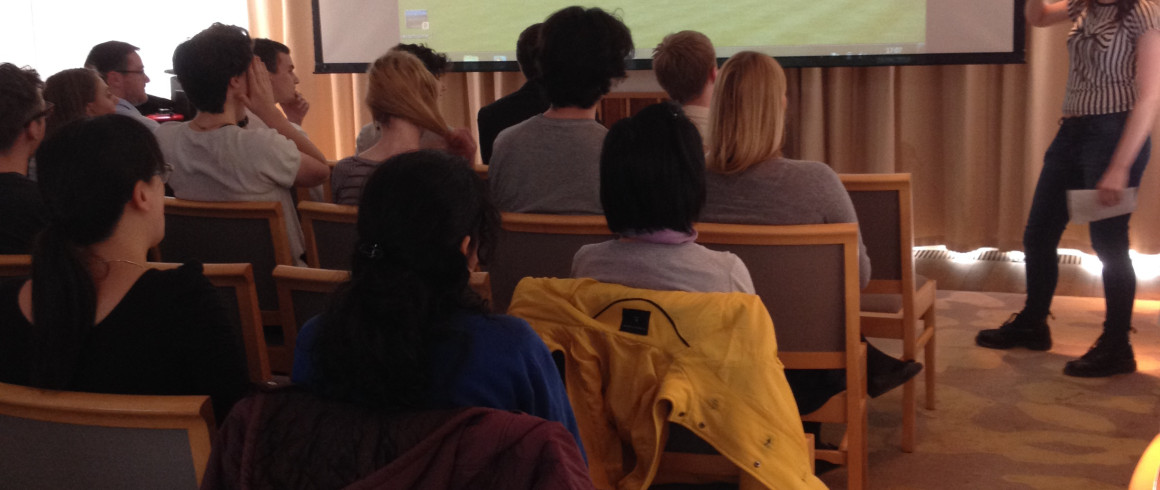The Graduate Parlour Presents
 Last week the Graduate Parlour held a 20/20 format seminar.
Last week the Graduate Parlour held a 20/20 format seminar.
Each of the five participants was allotted 20 slides and 20 seconds per slide to explain their research to the audience with a grand prize of a £50 book voucher to be claimed by the victor. The judging panel consisted of the Master, the Dean, and the tutor for Graduate Affairs, Loraine Gelsthorpe.
First up was Craig Burns (2011) a doctoral psychology candidate. With the aid of PowerPoint animations, Craig explained his study into how it may be possible to modify memories in order to help cure addiction. His presentation explained the mechanism behind storing and creating memories and how he is hoping to edit this process by using the drug propranolol in order to disrupt the memories that trigger the compulsive urge behind addiction.
Barry Colfer (2012) broke away from his usual study into Trade Unions for his PhD in Politics and International Studies to present ‘Brexit – 64 Days to go’. The Prime Minister has called the Brexit vote a “once in a generation” decision that is “more important than even a general election”. With this in mind, and based on the limited available information, his paper examined what the campaign so far could tell us about the state of British politics, and tentatively gauged what would need to happen for either the Remain or Leave camps to ultimately prevail.
History MPhil student Jonathan Nathan (2015) then changed the tone by discussing his endeavour to shed light on the mystery of who wrote the seventeenth century text Theophrastus Redivivus which is considered to be Europe’s ‘first atheist book’. He explained that he was piecing together where the author might have lived and who he socialised with based on information gathered from the citations of the work, of which there are over 1,000, and therefore which books and versions of them he would have had access to. One particular lead that he elaborated on are the references to Jean Bodin’s book Colloquium Heptaplomeres which could be a significant help as it only existed in manuscript form in the seventeenth century.
In an impressive feat of quick talking and thinking, Olivia Papp (2013), crammed her extensive MPhil Politics and International Studies research into into 20 slides that took a look at the new questions emerging about the role of the State in contemporary global capitalism thanks to technologies developed by companies such as Facebook and Google who are attempting to fill the gaps of ICT access worldwide. These questions focus on such issues as when foreign corporations take on development, how do networks of political accountability transform? Analyzing the role of corporate ICT development in Niger, her presentation challenged dominant models of state sovereignty and considered networks of state and non-state immunity as a potential corrective.

Peter Shyba (2015) finished off the presentations with an insight into the Black Panthers and their goal to create a sense of solidarity with radical movements around the world such as by using their connections to the Palestinian group Fatah. He concluded by discussing how this relationship was viewed by the American government and included an anecdote to illustrate the lengths that the CIA went to to discredit the Black Panthers and weaken their support.
Once the judges had deliberated, the Master returned to give verdict. He complimented Craig on making the science of his study very accessible and Olivia on the tons of really interesting material that she presented. Peter, he remarked, was the only one who had kept seamless time and credited him with the excellent conclusion of the narrative.
Jonathan was awarded the second prize ‘for telling a brilliant story’ with the Master noting that if he ‘had been told before this evening that he would be completely captivated by a seventeenth century manuscript he wouldn’t have believed it’.
The winner of the evening was Barry for a very clear and fluid presentation and displaying complete command of the subject especially when answering questions. Speaking to Kit, Barry said that the 20/20s are “great fun, [and a] good opportunity to hear from what your friends and colleagues are working on in a slightly more formal way and of course to share some time with the master and dean and to get their feedback”.
